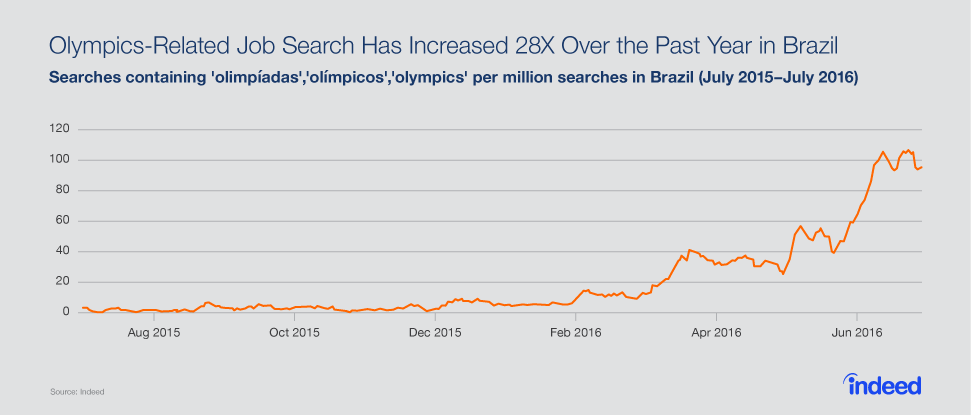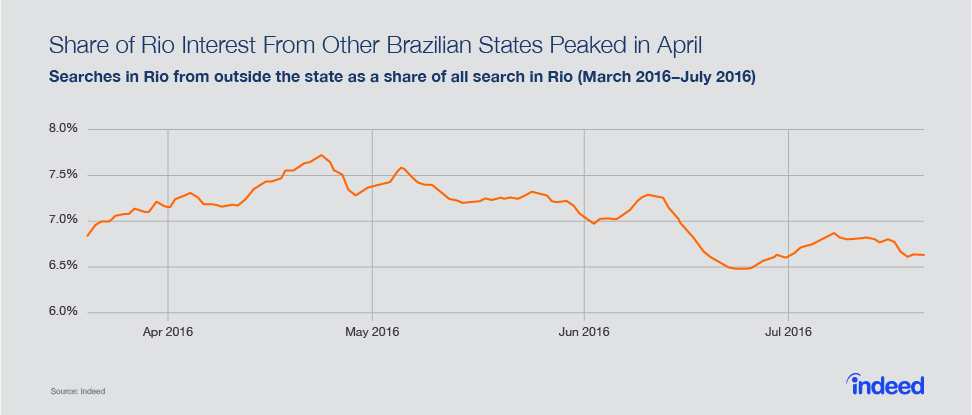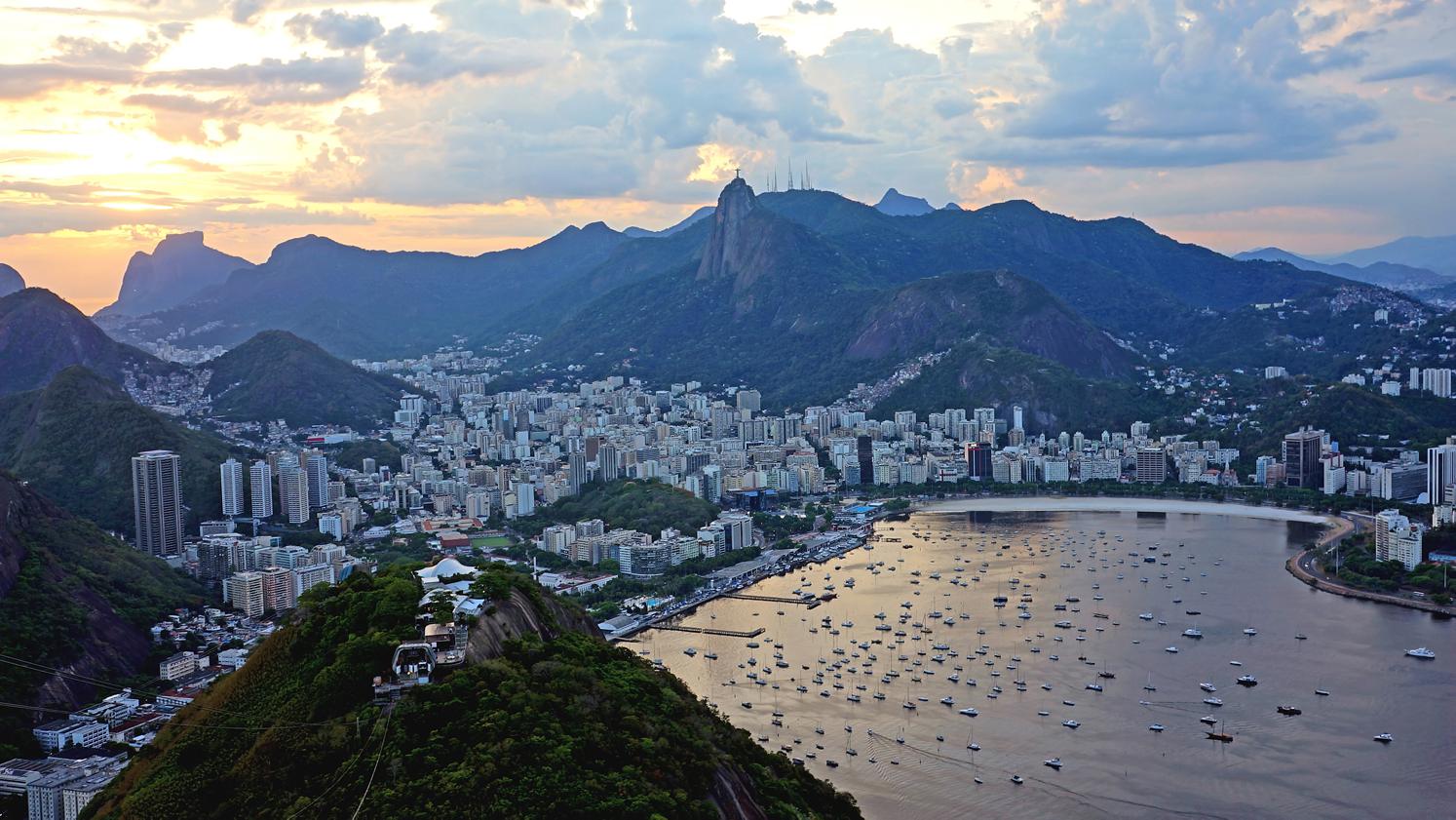On Friday, the Brazilian long distance runner Vanderlei de Lima lit the Olympic cauldron in Rio de Janiero, kicking off the biggest sporting event in the world. Over the next four weeks, the eyes of the world will be watching the best athletes alive today as they compete for gold in everything from archery to wrestling to rugby sevens.
It’s undeniable, however, that the run-up to this year’s Olympics was dominated by news of controversies, scandals and crises rather than feats of athleticism. In fact, according to one survey the negative publicity has had a serious impact on the enthusiasm of Brazilians for the games, with only 16% of Brazilians reporting that they felt “enthusiastic” about the Olympics before they began. Meanwhile, a massive 51% reported “no interest.”
Of course, the Olympics are about business, development and jobs as well as athletics. Here at Indeed, we were curious to see what impact the negative publicity had on job search in Rio in the run-up to the games. Let’s take a look at the data.
Job search for “Olympics” strong, spiking at the last minute
First, to gauge whether the negative publicity was weakening interest in games-related job opportunities, we analyzed job search traffic with “Olympics” in the title.

As the chart shows, searches with variations on “Olympics” in the keywords used were robust despite the negative publicity. Searches began to increase about a year ago, climbed steadily and then spiked dramatically in the immediate run-up to the Olympics — even as gloomy headlines were reaching critical mass. In fact, interest in finding work at the games peaked shortly before they began, with searches increasing by 60% between July and August.
It’s a different story when it comes to postings, however. These rose throughout the winter but peaked in February. For job seekers, then, it was already too late in the game by the time most of them started looking.
How attractive are Olympic jobs to the rest of Brazil?
The share of Rio job seekers who were searching for work in their own state stayed consistent at about 88% during the run-up to the Olympics. However the data also show a surge in people searching for work in Rio from elsewhere in the country over this time period.

Job search in Rio from elsewhere in Brazil peaked in April, when it accounted for nearly 8% of job search. Since then, however, the share of interest coming from other states has declined slightly and now stands at 6.6% — which is still a significant share.
How attractive are Olympics jobs to the rest of the world?
The numbers for job search in Rio originating outside of Brazil during this period are even more striking. Total inbound interest to Rio from outside now accounts for 10.5% of all job search there. The majority of traffic comes from elsewhere in Brazil but a significant 3.8% — one-third of inbound interest — comes from the international community.

In fact, of all job search in Rio originating outside the state’s borders, one-third of it comes from other countries, versus two-thirds from other Brazilian states. Meanwhile, over the past four months the share of searches coming from abroad has increased by an impressive 22%.
Thus while the Wall Street Journal reported lagging ticket sales and a softening of demand for hotels and flights, interest in finding work in Rio was moving in the opposite direction.
Many of the roles that people were searching for were low-skill, entry-level service positions, suggesting that these job seekers were not pursuing long-term careers in Rio. In fact, given the last minute spike, it seems possible that many of these international searchers may have been hoping to find a job that would enable them to take an Olympic-themed “working vacation.”
And the gold medal for international job search in Rio goes to…
As for which countries are sending so much job search to Rio, the overwhelming majority of international traffic comes from the United States.

“Overwhelming” may even be an understatement in this case. A total of 78.9% of job search in Rio from outside Brazil originates in the US, and as with other international search, much of this is for hospitality-related work such as “driver,” “receptionist” and “clerk.”
No other country even hits double digits. The next largest source of foreign job search in Rio is France, which accounts for a comparatively small 2.6%. In fact, European nations occupy seven of the slots.
Strikingly, meanwhile, Argentina is the only Latin American country that makes the top 10, coming in fourth. Even Portugal, Italy and Spain, all countries with high youth unemployment and sluggish economies, send more search towards Rio than the rest of Brazil’s immediate neighbors — a stark measure of the disparities of opportunity in the world.
What does this tell us about the Olympics?
While job search patterns may not enable us to predict whether the games will ultimately be viewed as a success, they do show us that interest in being present for the duration of the games remained very high in Brazil and around the world, regardless of the negative publicity.
Of course, many of these job seekers started looking far too late. For employers based in Rio, however, the effect of the Olympics was instant exposure to a large share of international talent.
Will this increase in exposure ultimately benefit Brazil’s economy? That remains to be seen. However, given the amount of interest in this most controversial of games, there can be no doubt that researchers will be looking into the games’ economic impact for years to come.

